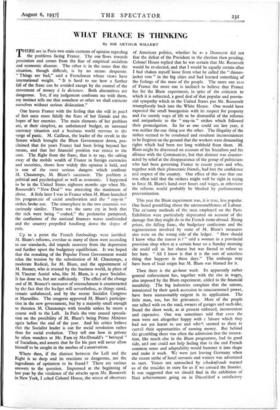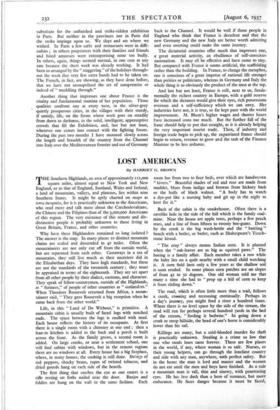WHAT FRANCE IS THINKING
By SIR ARTHUR WILLERT
THERE are in Paris two main currents of opinion regarding the problems facing France. The one flows towards pessimism and comes from the fear of empirical socialism and economic disaster. The other is in the sense that the situation, though difficult, is by no means desperate. " Things are bad," said a Frenchman whose views have international weight. " It is hard to see how a further fall of the franc can be avoided except by the control of the movement of money a la dictature. Both alternatives are dangerous. Yet, if my judgement confronts me with them, my instinct tells me that somehow or other we shall extricate ourselves without serious dislocation."
One leaves France with the feeling that she will in poir.t of fact once more falsify the fears of her friends and the hopes of her enemies. The main elements of her problem are, at their simplest, an unbalanced budget, an unsound currency situation and a business world nervous to the verge of panic. M Caillaux, the leader of the revolt in the Senate which brought the Blum Government down; pro- claimed that for years France had been living beyond her means, and that her financial position was rotten to the core. The flight from the franc, that is to say, the salting away of the mobile wealth of France in foreign currencies and securities, shows how widely this opinion is held, and is one of the most serious dangers which confront M. Chautemps, M. Blum's. successor. The problem is political and psychological as well as economic. I happened to be in the United States eighteen months ago when Mr. Roosevelt's " New Deal" was attracting the maximum of abuse. A little later I was in France when M. Blum launched his programme of social amelioration and the " stay-in " strikes broke out. The atmosphere in the two countries was Curiously similar. There was the same cry in both that the rich were being " soaked," the proletariat pampered, the confusions of the national finances worse confounded and the country propelled headlong down the slopes of ruin.
Up to a point the French forebodings were justified. M. Blum's reforms, overdue as many of them were according to our standards, did impede recovery from the depression and further upset the budgetary equilibrium. It was hoped that the remaking of the Popular Front Government would relax the tension by the substitution of M. Chautemps, a moderate Radical, for M. Blum, and the appointment of M. Bonnet; who is trusted by the business world, in place of M. Vincent Auriol who, like M. Blum, is a pure Socialist. It has done so, but not sufficiently. The effect of the change and of M. Bonnet's measures of retrenchment is counteracted by the fact that the budget will nevertheless, as things stand, remain unbalanced, and by the recent Socialist Congress at Marseilles. The congress approved M. Blum's participa- tion in the new government, but • by a majority small enough to threaten M. Chautemps with trouble unlesi he steers a course well to the Left. In Paris the vote caused specula- tion on the possibility of M. Blum's being Prime Minister again before the end of the year. And his critics believe that the Socialist leader is out for social revolution rather than for social evolution. They tell one how in private he often wonders at Mr. Ram ..,ay MacDonald's " betrayal of Socialism, and asserts that he for his part will never allow himself to be caught in the meshes of conservatism.
Where then, if the distrust between the Left and the Right is so deep and its reactions so dangerous, are the ingredients of optimism to be found ? There are various answers to the question. Impressed at the heijnning of last year by the virulence of the attacks upon Mr. Roosevelr in New York, I asked Colonel House, the wisest of observers of American politics, whether he as a Democrat did not fear' the defeat of the President in the election then pending. Colonel House replied that he was certain that Mr. Roosevelt would be re-elected, and that I would be equally certain after I had shaken myself loose from what he called the " dinner- jacket vote " in the big cities and had learned something of the feelings of the mass of the people. The more one sets Of France the more one is inclined to believe that France has for the Blum experiment, in spite of the criticism to which it is subjected, a good deal of that popular and provin- cial sympathy which in the United States put Mr. Roosevelt triumphantly back into the White House. One would have expected the small bourgeoisie with its respect for property and the seemly ways of life to be distrustful of the reforms and antipathetic to the " stay-in " strikes which followed their promulgation. So far as one could see last year, it was neither the one thing nor the other. The illegality of the strikes seemed to be condoned and resultant inconveniences to be forgiven on the ground that the workers were demanding rights which had been too long withheld from them. M. Blum might be distrusted on account of his Socialism and his alliance with the Communists, but that distrust was counter- acted by relief at the disappearance of the group of politicians who had been governing France in recent years and who, together with their plutocratic friends, had lost the confidence and respect of the country. One effect of this was that one was often told that the strikers might well be right in trying to force M. Blum's hand over hours and wages, as otherwise the reforms would probably be blocked by parliamentary procrastination.
This year the Blum experiment was, it is true, less popular. One heard grumbling about the unreasonableness of Labour. The ca'canny methods of the men employed on the Paris Exhibition were particularly deprecated on account of the damage that they might do to the French name abroad. Rising prices, the falling franc, the budgetary confusions and the regimentation involved by some of M. Blum's measures also went on the wrong side of the ledger. " How should I know what the reason is ? " said a woman in a provincial provision shop when at a certain hour on a Sunday morning she could sell us her cheese but was forced to refuse us her ham. " All I know is that it is the sort of senseless thing that happens in these days." The embargo may have been of local origin but M. Blum was blamed for it.
Then there is the 4o-hour week. Its apparently rather general enforcement has, together with the rise in wages, also imposed by the Blum experiment, added to the financial instability. The big industries complain that the unions, intoxicated by their quick accession to unaccustomed power, have been unreasonably exigent in its application. The little man, too, has his grievances. Most of the people one talked with on the road, owners of garages and such-like, found the short week, as at present enforced, inconvenient and expensive. One was sometimes told that even the men were not altogether happy with z leisure which they had not yet learnt to use and whirh seemed to them to curtail their opportunities of earning money. But behind the grumbling there was often the admission that the innova- tion, like much else in the Blum programme, had its good side, and one could not help feeling that in the end French common sense and adaptability would hammer it into shape and make it work. We were just leaving Germany when the recent strike of hotel servants and waiters was advertised to start. Voices not untouched by schadenfreude warned us of the troubles in store for us if we crossed the frontier. It was suggested that we should find in the exhibition of Nazi achievements going on in Dusseldorf a satisfactory substitute for the unfinished and strike-ridden exhibition in Paris. But neither in the provinces nor in Paris did the strike impinge upon us. We slept and ate where we wished. In Paris a few cafes and restaurants were in diffi- culties ; in others proprietors with their families and friends and hired amateurs were extemporising none too badly. In others, again, things seemed normal, in one case at any rate because the short week was already working. It had been so arranged by the " staggering " of the holidays through- out the week that very few extra hands had to be taken on. The French, in fact, are showing, as they have done before, that we have not monopolised the art of compromise or indeed of " muddling through."
Another thing that impresses one about France is the vitality and fundamental stamina of her population. Those qualities confront one at every turn, in the silver-grey quietly prosperous cities, in the villages with their sturdy, if untidy, life, on the farms where work goes on steadily from dawn to darkness, in the solid, intelligent, apperceptive crowds that fill the Exhibition, and, last but not least, wherever one comes into contact with the fighting forces. During the past two months I have motored slowly across the length and breadth of the country from the Channel into Italy over the Mediterranean frontier and out of Germany back to the Channel. It would be well if those people in England who think that France is decadent and that the new Germany and the new Italy are better worth admiring and even courting could make the same journey.
The dictatorial countries offer much that impresses one, a great material activity, an ebullience of self-conscious nationalism. It may all be effective and have come to stay. But compared with France it seems artificial, the scaffolding rather than the building. In France, to change the metaphor, one is conscious of a great impetus of national life stronger than politics or politicians, whereas in Germany and Italy the whole thing is so obviously the product of the men at the top.
And last but not least, France is still, next to us, funda- mentally the richest country in Europe, with a gold reserve for which the dictators would give their eyes, rich possessions overseas and a self-sufficiency which we can envy. Her industries have not, it is true, so far kept pace with the world improvement. M. Blum's higher wages and shorter hours have increased costs too much. But the further fall of the franc should help to put that straight, as it is already helping the very important tourist trade. Then, if industry and foreign trade begin to pick up, the expatriated francs should begin to return, revenue to grow and the task of the Finance Minister to be less arduous.







































 Previous page
Previous page